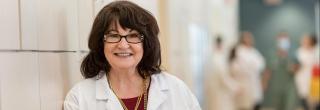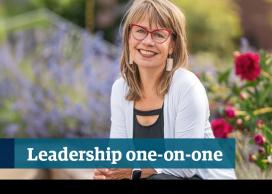Dr. Mary MacDougall joined UBC in August 2017, as Dean of the Faculty of Dentistry. From the US originally, she is an internationally recognized scholar, having published 18 book chapters and over 150 peer-reviewed articles. In addition to holding leadership positions at the University of Texas Health Science Center at San Antonio and most recently, at the University of Alabama at Birmingham, Dr. MacDougall has served as President of the International Association for Dental Research and as President of the American Association of Dental Research.
Q1. What quality do you most admire in a leader?
MM: I admire leaders who are creative in their leadership approach. Being creative in the workplace, and tapping into the creativity of your diverse workforce, I believe, provides organizations the ability to be innovative and dynamic in nature. This approach has worked well for Google and Apple.
Q2. What makes you laugh?
MM: My children have always been the source of great humor. Children are the greatest entertainers in the world.
Q3. Who inspires you, and why?
MM: My father. He was initially a bricklayer, who learned drafting/technical drawing. With that skillset, he was able to move the family from Ohio to California to take a position in aerospace engineering. While working full-time, he went back to school and actually completed his degree in engineering (I remember attending his college graduation while I was at elementary school). His hard work instilled in me a deep appreciation for education. He also spent a lot of time doing math with me, which gave me the foundation to go into science, which was unusual for women at that time.
Q4. What do you value in your colleagues?
MM: I value colleagues who are passionate about what they do. I keep a sign in my office that says, ‘Do it with passion’, which I refer to often when meeting with my colleagues.
Q5. If you could have a super power, what would it be?
MM: To read other peoples’ minds. When entering new environments like here at UBC, it would facilitate the relationship development process if I knew what people were really thinking!
Q6. How do you like to recharge?
MM: I have many artistic endeavors, including painting, jewelry making and fashion design. I think my interest in art in my personal life is connected to my firm belief in creativity in my professional life. While a graduate student at the University of Southern California, I had a store called T-ZERS in Venice Beach selling my own line of hand-painted t-shirts and streetwear. Right now, I’m working on creating art pieces to decorate my new apartment on campus.
Q7. What’s the most important lesson you’ve learned?
MM: The lessons I’ve learned from my parents: to respect people and treat them as you would want to be treated, and to always give yourself and your time to others in the community, in order to help better them.
These values have been reaffirmed in some of the leadership books I’ve read, including Marshall Goldsmith’s What Got You Here Won’t Get You There. This book speaks to the kind of behavioral skills a leader should have, rather than technical ones. I really relate to the ideals of saying thank you, listening to people, thinking before you speak, and not being above an apology if you make a mistake. These are principles I’ve always tried to live by in my career. They’re basic, but I believe they go a long way.
Q8. What drew you to UBC?
MM: One of the reasons I wanted to come to UBC’s Faculty of Dentistry, was because of its levels of excellence in global reputation. (In the 2018 QS Top Universities ranking by subject, UBC’s dentistry program is number one in Canada, seventh in North America, and twentieth globally.) In previous leadership roles, I have been brought in to fix something and make it better, so having the opportunity to take something that is already excellent and expand upon it was a different and very exciting opportunity for me.
Q9. What is your vision for the Faculty of Dentistry for the next five years?
MM: I believe we need to focus on building on our mission to amplify research productivity, enhance the student experience, and increase community involvement especially with our alumni.
To do this, we need to provide a development program for our junior faculty, so we are creating leaders in the field of oral health, and ultimately gaining a reputation for doing so.
On the research front, we have an opportunity to expand the contributions that our faculty are making to the literature and to oral health research. We hope to expand the collaborations happening within the Faculty of Dentistry to the UBC community at large. There are so many gifted research investigators on campus; partnering with them, we will be able to find research solutions that will improve the overall health of our community and nation. This is a very exciting opportunity for us to expand our impact on UBC and dental oral health.
Our curriculum is currently seen as very innovative, and we would like to continue to build on our best practices. We are looking to expand into the very dynamic progression of dentistry, including areas of digital dentistry where new technologies are being incorporated into the profession to provide better care at a lower cost, and educating our students in this cutting-edge technology.
Finally, we have the opportunity to build relationships with our alumni and our community stakeholders and engage them proactively in partnerships that can improve dental education and the oral health of Canadians.
Q10. What impact do you feel dentistry can have on the healthcare system in both British Columbia and Canada as a whole?
MM: I believe we have an opportunity to help Canadians better understand the importance of oral health, and specifically, a better understanding of the link between oral health and systemic health. What many people don’t know is that the state of oral health can often be an early indicator of serious diseases. For example, there are links between oral health and premature birth, low birth weight, cardiovascular disease, and indications of type 2 diabetes. So, one of the areas that I think we can have the greatest impact is in helping people understand these connections.
In Canada, we’re so fortunate that many people have dental insurance. However, those who are uninsured have limited access to oral care and are often the most vulnerable populations like children and the elderly. Another area I feel we can have an impact is reaching out to these groups and providing needed care. We already have some initiatives in place within the Faculty to provide care in the community, especially to the elderly. I hope in general, we can increase the awareness of the need for dental oral health in British Columbia.
Q11. What would you like to be remembered for?
MM: One of the things I’m most proud of is my mentorship work. I’ve worked with individuals at all levels, including high school students, undergraduate students, dental and medical students, graduate students, and junior faculty. In previous roles, I have developed pipeline programs for minority students and I’m very proud that those programs have led to increased enrollment in dentistry from these populations.
I’ve also worked with senior postdoc students and junior faculty looking for support navigating their first academic appointments and the promotion and tenure process. This has led to providing programming for dental schools and organizations, including the International Association for Dental Research, where I helped to organize a women’s network designed to foster more women in the profession and to support them in their career advancement and research success.
I get great personal satisfaction through my mentorship and would hope to be remembered for the impact I’ve had on the careers of the individuals I’ve had the opportunity to work with.
Published: April 1, 2018
Interviewed by: Megan Czerpak, UBC Internal Communications



